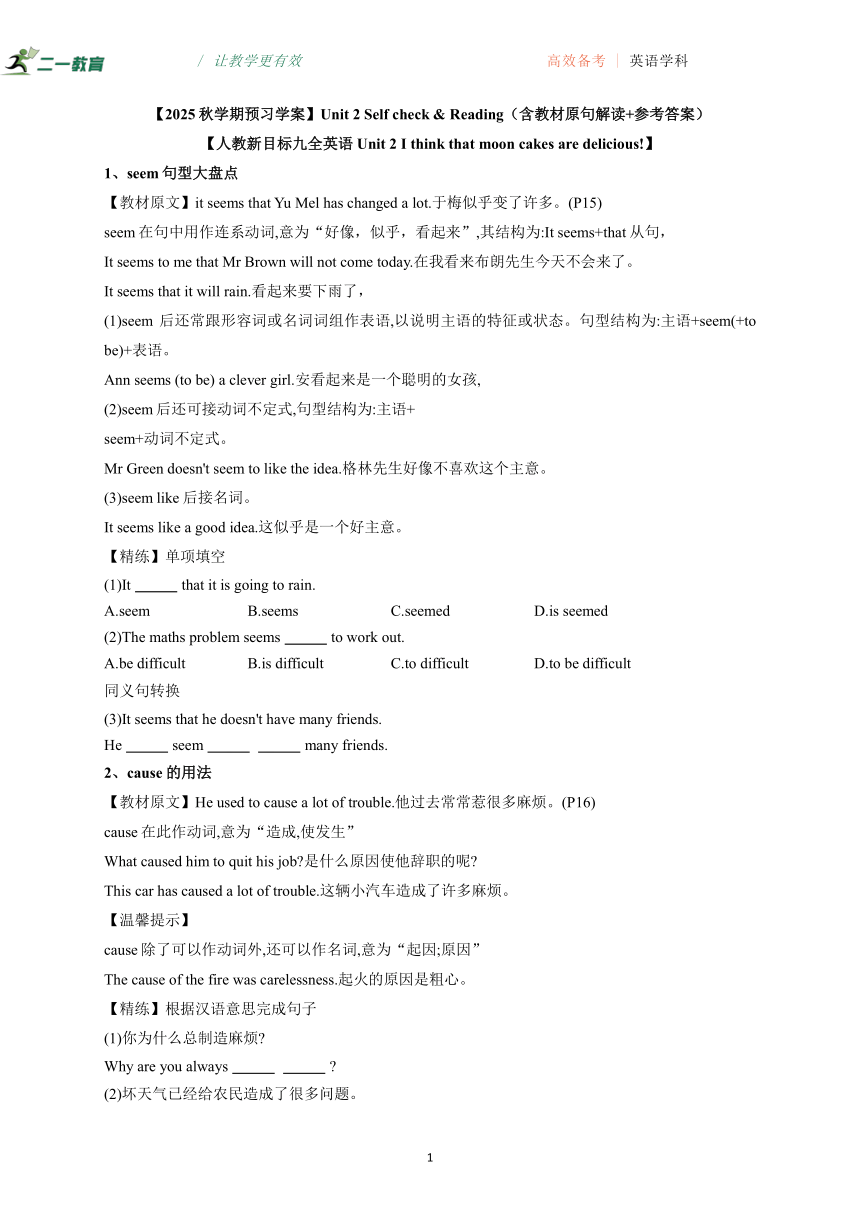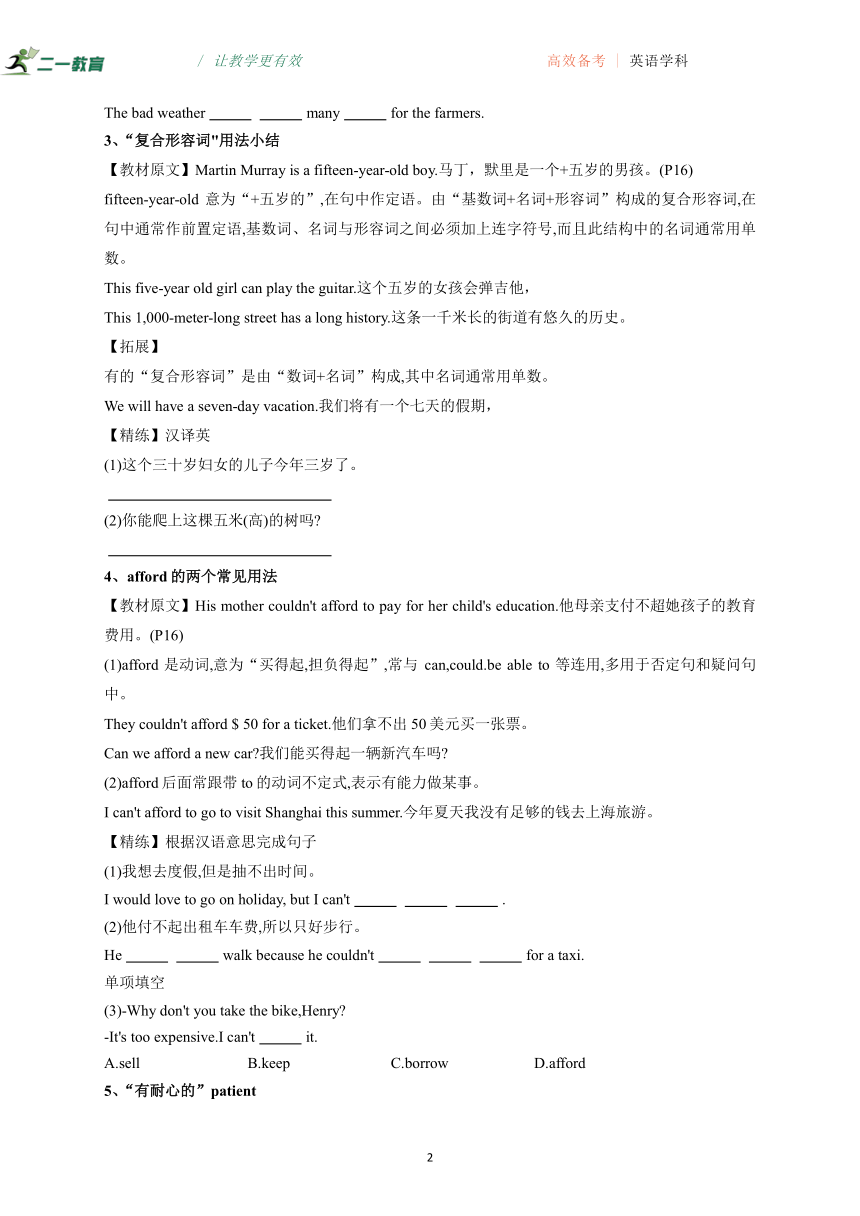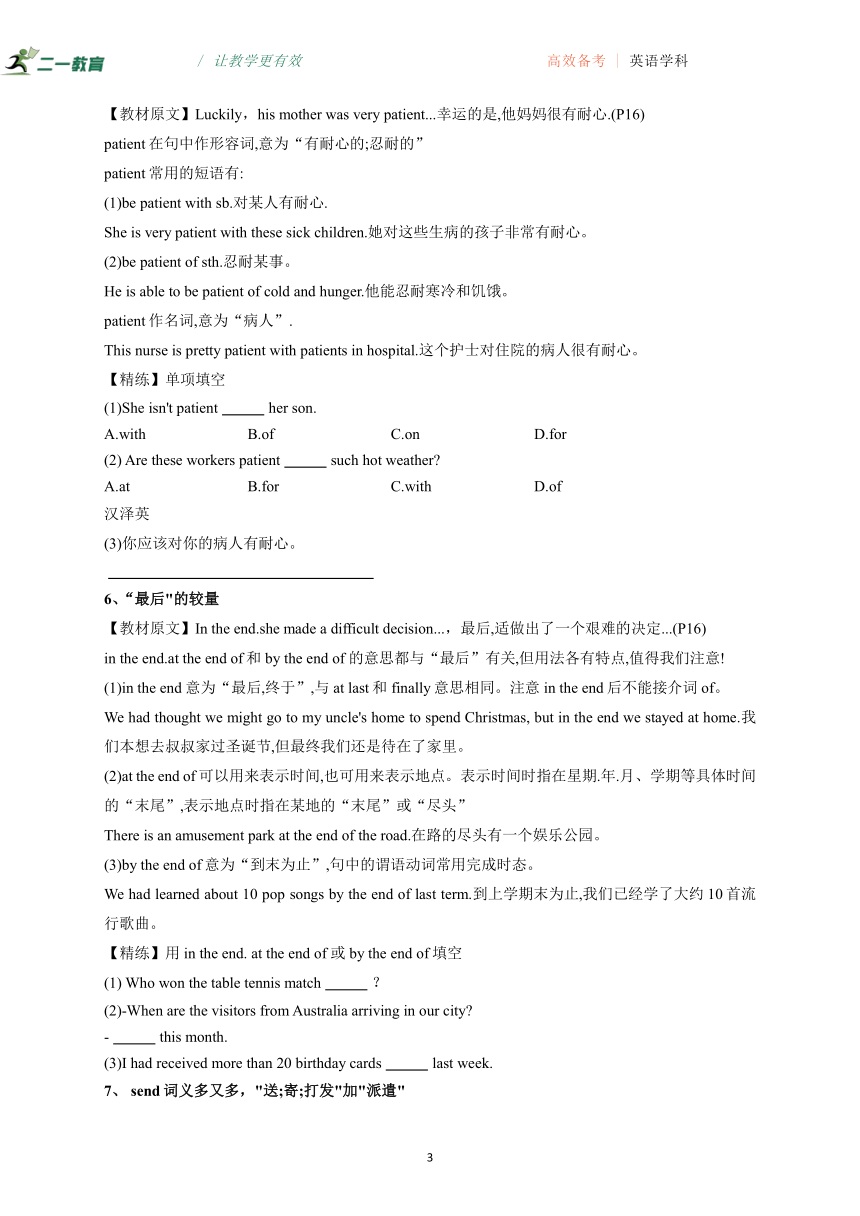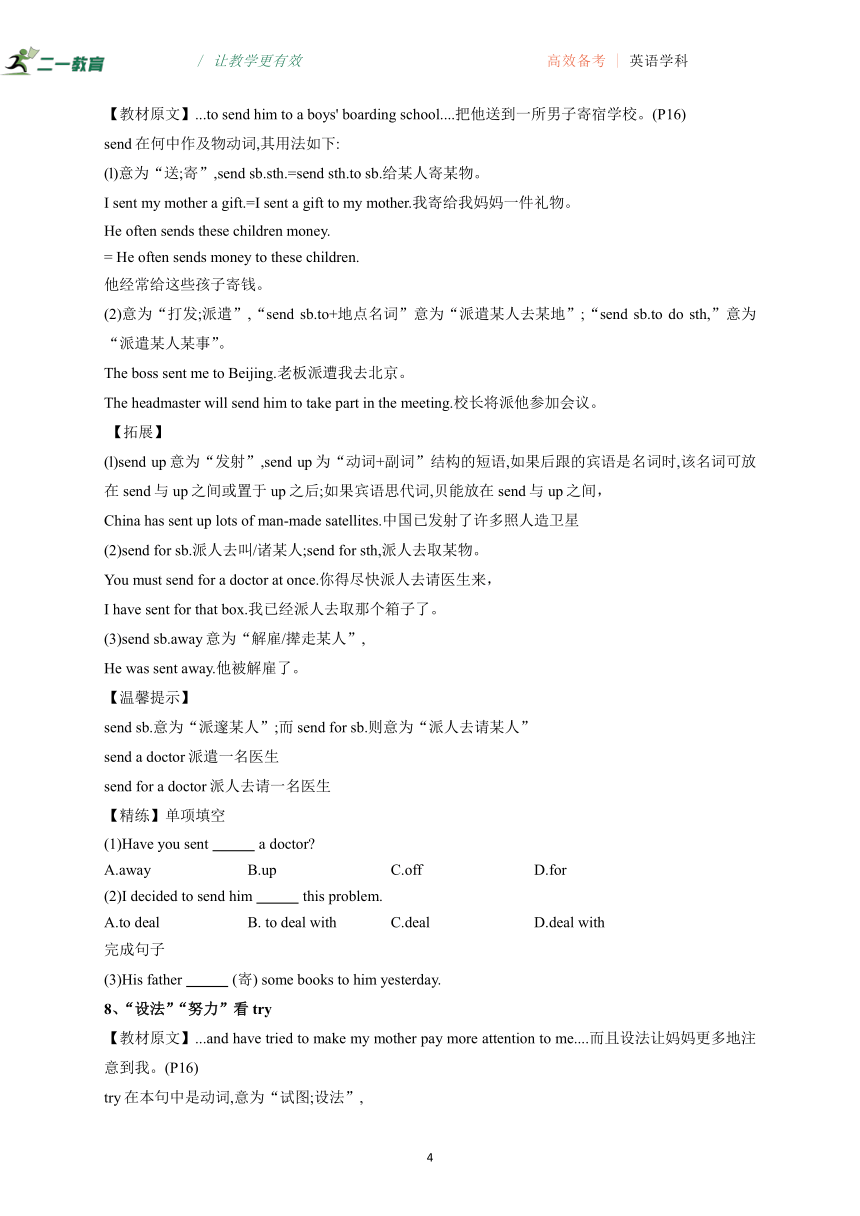【2025秋学期预习学案】Unit 2 I think that moon cakes are delicious!(含教材原句解读+参考答案)
文档属性
| 名称 | 【2025秋学期预习学案】Unit 2 I think that moon cakes are delicious!(含教材原句解读+参考答案) |  | |
| 格式 | docx | ||
| 文件大小 | 1.1MB | ||
| 资源类型 | 试卷 | ||
| 版本资源 | 人教新目标(Go for it)版 | ||
| 科目 | 英语 | ||
| 更新时间 | 2025-07-24 05:37:09 | ||
图片预览




文档简介
/ 让教学更有效 高效备考 | 英语学科
【2025秋学期预习学案】Unit 2 Self check & Reading(含教材原句解读+参考答案)
【人教新目标九全英语Unit 2 I think that moon cakes are delicious!】
1、seem句型大盘点
【教材原文】it seems that Yu Mel has changed a lot.于梅似乎变了许多。(P15)
seem在句中用作连系动词,意为“好像,似乎,看起来”,其结构为:It seems+that从句,
It seems to me that Mr Brown will not come today.在我看来布朗先生今天不会来了。
It seems that it will rain.看起来要下雨了,
(1)seem后还常跟形容词或名词词组作表语,以说明主语的特征或状态。句型结构为:主语+seem(+to be)+表语。
Ann seems (to be) a clever girl.安看起来是一个聪明的女孩,
(2)seem后还可接动词不定式,句型结构为:主语+
seem+动词不定式。
Mr Green doesn't seem to like the idea.格林先生好像不喜欢这个主意。
(3)seem like后接名词。
It seems like a good idea.这似乎是一个好主意。
【精练】单项填空
(1)It that it is going to rain.
A.seem B.seems C.seemed D.is seemed
(2)The maths problem seems to work out.
A.be difficult B.is difficult C.to difficult D.to be difficult
同义句转换
(3)It seems that he doesn't have many friends.
He seem many friends.
2、cause 的用法
【教材原文】He used to cause a lot of trouble.他过去常常惹很多麻烦。(P16)
cause在此作动词,意为“造成,使发生”
What caused him to quit his job 是什么原因使他辞职的呢
This car has caused a lot of trouble.这辆小汽车造成了许多麻烦。
【温馨提示】
cause除了可以作动词外,还可以作名词,意为“起因;原因”
The cause of the fire was carelessness.起火的原因是粗心。
【精练】根据汉语意思完成句子
(1)你为什么总制造麻烦
Why are you always
(2)坏天气已经给农民造成了很多问题。
The bad weather many for the farmers.
3、“复合形容词"用法小结
【教材原文】Martin Murray is a fifteen-year-old boy.马丁,默里是一个+五岁的男孩。(P16)
fifteen-year-old意为“+五岁的”,在句中作定语。由“基数词+名词+形容词”构成的复合形容词,在句中通常作前置定语,基数词、名词与形容词之间必须加上连字符号,而且此结构中的名词通常用单数。
This five-year old girl can play the guitar.这个五岁的女孩会弹吉他,
This 1,000-meter-long street has a long history.这条一千米长的街道有悠久的历史。
【拓展】
有的“复合形容词”是由“数词+名词”构成,其中名词通常用单数。
We will have a seven-day vacation.我们将有一个七天的假期,
【精练】汉译英
(1)这个三十岁妇女的儿子今年三岁了。
(2)你能爬上这棵五米(高)的树吗
4、afford的两个常见用法
【教材原文】His mother couldn't afford to pay for her child's education.他母亲支付不超她孩子的教育费用。(P16)
(1)afford是动词,意为“买得起,担负得起”,常与can,could.be able to等连用,多用于否定句和疑问句中。
They couldn't afford $ 50 for a ticket.他们拿不出50美元买一张票。
Can we afford a new car 我们能买得起一辆新汽车吗
(2)afford后面常跟带to的动词不定式,表示有能力做某事。
I can't afford to go to visit Shanghai this summer.今年夏天我没有足够的钱去上海旅游。
【精练】根据汉语意思完成句子
(1)我想去度假,但是抽不出时间。
I would love to go on holiday, but I can't .
(2)他付不起出租车车费,所以只好步行。
He walk because he couldn't for a taxi.
单项填空
(3)-Why don't you take the bike,Henry
-It's too expensive.I can't it.
A.sell B.keep C.borrow D.afford
5、“有耐心的”patient
【教材原文】Luckily,his mother was very patient...幸运的是,他妈妈很有耐心.(P16)
patient在句中作形容词,意为“有耐心的;忍耐的”
patient常用的短语有:
(1)be patient with sb.对某人有耐心.
She is very patient with these sick children.她对这些生病的孩子非常有耐心。
(2)be patient of sth.忍耐某事。
He is able to be patient of cold and hunger.他能忍耐寒冷和饥饿。
patient作名词,意为“病人”.
This nurse is pretty patient with patients in hospital.这个护士对住院的病人很有耐心。
【精练】单项填空
(1)She isn't patient her son.
A.with B.of C.on D.for
(2) Are these workers patient such hot weather
A.at B.for C.with D.of
汉泽英
(3)你应该对你的病人有耐心。
6、“最后"的较量
【教材原文】In the end.she made a difficult decision...,最后,适做出了一个艰难的决定...(P16)
in the end.at the end of和by the end of 的意思都与“最后”有关,但用法各有特点,值得我们注意!
(1)in the end 意为“最后,终于”,与 at last和finally意思相同。注意in the end后不能接介词of。
We had thought we might go to my uncle's home to spend Christmas, but in the end we stayed at home.我们本想去叔叔家过圣诞节,但最终我们还是待在了家里。
(2)at the end of 可以用来表示时间,也可用来表示地点。表示时间时指在星期.年.月、学期等具体时间的“末尾”,表示地点时指在某地的“末尾”或“尽头”
There is an amusement park at the end of the road.在路的尽头有一个娱乐公园。
(3)by the end of意为“到末为止”,句中的谓语动词常用完成时态。
We had learned about 10 pop songs by the end of last term.到上学期末为止,我们已经学了大约10首流行歌曲。
【精练】用 in the end. at the end of 或 by the end of填空
(1) Who won the table tennis match ?
(2)-When are the visitors from Australia arriving in our city
- this month.
(3)I had received more than 20 birthday cards last week.
7、 send词义多又多,"送;寄;打发"加"派遣"
【教材原文】...to send him to a boys' boarding school....把他送到一所男子寄宿学校。(P16)
send在何中作及物动词,其用法如下:
(l)意为“送;寄”,send sb.sth.=send sth.to sb.给某人寄某物。
I sent my mother a gift.=I sent a gift to my mother.我寄给我妈妈一件礼物。
He often sends these children money.
= He often sends money to these children.
他经常给这些孩子寄钱。
(2)意为“打发;派遣”,“send sb.to+地点名词”意为“派遣某人去某地”;“send sb.to do sth,”意为“派遣某人某事”。
The boss sent me to Beijing.老板派遭我去北京。
The headmaster will send him to take part in the meeting.校长将派他参加会议。
【拓展】
(l)send up意为“发射”,send up为“动词+副词”结构的短语,如果后跟的宾语是名词时,该名词可放在send与up之间或置于up之后;如果宾语思代词,贝能放在send与up之间,
China has sent up lots of man-made satellites.中国已发射了许多照人造卫星
(2)send for sb.派人去叫/诸某人;send for sth,派人去取某物。
You must send for a doctor at once.你得尽快派人去请医生来,
I have sent for that box.我已经派人去取那个箱子了。
(3)send sb.away意为“解雇/撵走某人”,
He was sent away.他被解雇了。
【温馨提示】
send sb.意为“派邃某人”;而send for sb.则意为“派人去请某人”
send a doctor派遣一名医生
send for a doctor派人去请一名医生
【精练】单项填空
(1)Have you sent a doctor
A.away B.up C.off D.for
(2)I decided to send him this problem.
A.to deal B. to deal with C.deal D.deal with
完成句子
(3)His father (寄) some books to him yesterday.
8、“设法”“努力”看try
【教材原文】...and have tried to make my mother pay more attention to me....而且设法让妈妈更多地注意到我。(P16)
try在本句中是动词,意为“试图;设法”,
I'm trying to work out the maths problem.我正设法算出这道数学题。
【辨析】try to do sth.与try doing sth.
(1)try to do sth.意为“尽力做某事”
He tried to finish the work ahead of time.
他尽力提前完成这项工作
(2)try doing sth.意为“试着做某事”.
Let's try knocking at the back door.咱们敲后门试试。
【温馨提示】
try one's best to do sth.=do one's best to do sth.努力/尽力去做某事
try out 试验
【精练】单项填空
(1)Why it in some other ways
A.not try to do B.don't try doing C.not try doing D.don't try to do
(2)The doctors have tried the sick boy.
A.his best to save B.their best saving C.his best saving D.their best to save
(3) How nice the jacket is! Can I it
A.try;out B.try;in C.try;on D.try;again
根据汉语意思完成句子
(4)我们应该试验更多的新设想
We should more new ideas.
9、看 give up 如何“放弃”
【教材原文】and didn't give up trying to help him.而且没有放京尽力帮助他(P17)
give up意为“放弃”,是及物动词短语,后面接名词、动名词或代词作宾语,而且如果宾语是代词,只能放在give与up之间。
He never gives up his dream.他从没有放弃他的梦想。
Try it again;don't give it up.再试一次,不要放弃.
give up作不及物动词短语时,意为“投降;屈服”相当于give in。
He would die rather than give in.他宁死不屈。
【精练】根据汉语意思完成句子
你应该戒烟。You should .
10、“死”的形式多样化
【教材原文】after his fathers death a few years ago 几年前他父亲去世后(P17)
death是名词,意为“死,死亡”
He is not afraid of death.他不怕死
【辨析】表达“死”有多个单词,请看下表,注意区别。
词条 区别 例句
death 名词,“死”“死去” My little dog's death made me sad.我的小狗的死让我很悲伤。
die 动词,“死亡”,它是非延续性动词,如果和一段时间连用,要用be dead代替 His mother died two years ago.他母亲两年前去世了。 His mother has been deed for two years.他母亲去世两年了
dead 形容词,“死的” He was dead because of hunger.他因饥饿而死。
dying die的现在分词,常作形容词,“要死的,垂危的” The dog is dying.这条狗快要死了。
【精练】同义句转换
(1)His father died 3 years ago.
His father has 3 years.
单项填空
(2)The old man told his sons all about his money they wanted.
A.died B.death C.dead D.dying
11重点短语
(1)make a decision做决定;下决心
(2)to one's surprise使某人吃惊的是;使某人惊奇的是
(3)even though尽管,即使,纵然
(4)take pride in对感到白豪
(5)pay attention to 注意...
【精练】单项填空
(1)When I entered the classroom ,my surprise,all of the students stood up quickly.
A.for B.with C.to D.in
完成句子
(2)Bill (已下决心)to study hard this semester.
(3)I work hard so that one day my parents will (以我为荣).
(4) You should (对...多关注)your son's study.
(5) (尽管)I didn't do well in my lessons,I (从没)gave up.
SELF CHIECK & READING答案解析
1.(1)B 从句用了一般将来时,由此可推知主句应是一般现在时,主语是第三人称单数,所以谓语动词用 seems。
(2)D 主语seem+to be+表语。
(3)doesn't,to have
2.(1)causing trouble
(2)has caused,problems
3.(1)This thirty-year-old woman's son is three years old this year.
(2)Can you climb up this five-meter tree
4.(1)afford the time (2)had to,afford to pay
(3)D afford常与can,could,be able to 连用,意为“买得起,负担得起”,后常接名词、代词或动词不定式。
5.(1)A be patient with sb.是固定短语,意为“对某人有耐心”.
(2)D be patient of sth.是固定短语,意为“忍耐某事”。
(3) You should be patient with your patients.
6.(1)in the end
(2)At the end of
(3)by the end of
7.(1)D send for sb.意为“派人去请某人”。
(2)B send sb.to do sth.是固定搭配,意为“派遣某人做某事”。
(3)sent
8.(1)C Why not do sth. 是固定搭配,意为“为什么不...呢 ”根据这一点可排除 B和 D。该句意为“你为什么不用其他方法试一下呢 ”;“试着做某事”应说成 try doing sth.。故选 C。
(2)D try one’s best to do sth.意为“尽某人最大努力做某事”;又根据主语 doctors 可知,try one's best 中的 one's 应为 their,因此答案为D。
(3)C try on意为“试穿;试戴”。
(4)try out try out意为“试验”。
9. give up smoking
10.(1)been dead for
(2)D 句意:那位垂死的老人告诉了儿子们他们想要的钱。
11.(1)C to one’s surprise“使某人惊奇的是”,是固定短语。
(2)has made a decision
(3)take pride in me
(4)pay more attention to
(5)Even though,never
【2025秋学期预习学案】Unit 2 Self check & Reading(含教材原句解读+参考答案)
【人教新目标九全英语Unit 2 I think that moon cakes are delicious!】
1、seem句型大盘点
【教材原文】it seems that Yu Mel has changed a lot.于梅似乎变了许多。(P15)
seem在句中用作连系动词,意为“好像,似乎,看起来”,其结构为:It seems+that从句,
It seems to me that Mr Brown will not come today.在我看来布朗先生今天不会来了。
It seems that it will rain.看起来要下雨了,
(1)seem后还常跟形容词或名词词组作表语,以说明主语的特征或状态。句型结构为:主语+seem(+to be)+表语。
Ann seems (to be) a clever girl.安看起来是一个聪明的女孩,
(2)seem后还可接动词不定式,句型结构为:主语+
seem+动词不定式。
Mr Green doesn't seem to like the idea.格林先生好像不喜欢这个主意。
(3)seem like后接名词。
It seems like a good idea.这似乎是一个好主意。
【精练】单项填空
(1)It that it is going to rain.
A.seem B.seems C.seemed D.is seemed
(2)The maths problem seems to work out.
A.be difficult B.is difficult C.to difficult D.to be difficult
同义句转换
(3)It seems that he doesn't have many friends.
He seem many friends.
2、cause 的用法
【教材原文】He used to cause a lot of trouble.他过去常常惹很多麻烦。(P16)
cause在此作动词,意为“造成,使发生”
What caused him to quit his job 是什么原因使他辞职的呢
This car has caused a lot of trouble.这辆小汽车造成了许多麻烦。
【温馨提示】
cause除了可以作动词外,还可以作名词,意为“起因;原因”
The cause of the fire was carelessness.起火的原因是粗心。
【精练】根据汉语意思完成句子
(1)你为什么总制造麻烦
Why are you always
(2)坏天气已经给农民造成了很多问题。
The bad weather many for the farmers.
3、“复合形容词"用法小结
【教材原文】Martin Murray is a fifteen-year-old boy.马丁,默里是一个+五岁的男孩。(P16)
fifteen-year-old意为“+五岁的”,在句中作定语。由“基数词+名词+形容词”构成的复合形容词,在句中通常作前置定语,基数词、名词与形容词之间必须加上连字符号,而且此结构中的名词通常用单数。
This five-year old girl can play the guitar.这个五岁的女孩会弹吉他,
This 1,000-meter-long street has a long history.这条一千米长的街道有悠久的历史。
【拓展】
有的“复合形容词”是由“数词+名词”构成,其中名词通常用单数。
We will have a seven-day vacation.我们将有一个七天的假期,
【精练】汉译英
(1)这个三十岁妇女的儿子今年三岁了。
(2)你能爬上这棵五米(高)的树吗
4、afford的两个常见用法
【教材原文】His mother couldn't afford to pay for her child's education.他母亲支付不超她孩子的教育费用。(P16)
(1)afford是动词,意为“买得起,担负得起”,常与can,could.be able to等连用,多用于否定句和疑问句中。
They couldn't afford $ 50 for a ticket.他们拿不出50美元买一张票。
Can we afford a new car 我们能买得起一辆新汽车吗
(2)afford后面常跟带to的动词不定式,表示有能力做某事。
I can't afford to go to visit Shanghai this summer.今年夏天我没有足够的钱去上海旅游。
【精练】根据汉语意思完成句子
(1)我想去度假,但是抽不出时间。
I would love to go on holiday, but I can't .
(2)他付不起出租车车费,所以只好步行。
He walk because he couldn't for a taxi.
单项填空
(3)-Why don't you take the bike,Henry
-It's too expensive.I can't it.
A.sell B.keep C.borrow D.afford
5、“有耐心的”patient
【教材原文】Luckily,his mother was very patient...幸运的是,他妈妈很有耐心.(P16)
patient在句中作形容词,意为“有耐心的;忍耐的”
patient常用的短语有:
(1)be patient with sb.对某人有耐心.
She is very patient with these sick children.她对这些生病的孩子非常有耐心。
(2)be patient of sth.忍耐某事。
He is able to be patient of cold and hunger.他能忍耐寒冷和饥饿。
patient作名词,意为“病人”.
This nurse is pretty patient with patients in hospital.这个护士对住院的病人很有耐心。
【精练】单项填空
(1)She isn't patient her son.
A.with B.of C.on D.for
(2) Are these workers patient such hot weather
A.at B.for C.with D.of
汉泽英
(3)你应该对你的病人有耐心。
6、“最后"的较量
【教材原文】In the end.she made a difficult decision...,最后,适做出了一个艰难的决定...(P16)
in the end.at the end of和by the end of 的意思都与“最后”有关,但用法各有特点,值得我们注意!
(1)in the end 意为“最后,终于”,与 at last和finally意思相同。注意in the end后不能接介词of。
We had thought we might go to my uncle's home to spend Christmas, but in the end we stayed at home.我们本想去叔叔家过圣诞节,但最终我们还是待在了家里。
(2)at the end of 可以用来表示时间,也可用来表示地点。表示时间时指在星期.年.月、学期等具体时间的“末尾”,表示地点时指在某地的“末尾”或“尽头”
There is an amusement park at the end of the road.在路的尽头有一个娱乐公园。
(3)by the end of意为“到末为止”,句中的谓语动词常用完成时态。
We had learned about 10 pop songs by the end of last term.到上学期末为止,我们已经学了大约10首流行歌曲。
【精练】用 in the end. at the end of 或 by the end of填空
(1) Who won the table tennis match ?
(2)-When are the visitors from Australia arriving in our city
- this month.
(3)I had received more than 20 birthday cards last week.
7、 send词义多又多,"送;寄;打发"加"派遣"
【教材原文】...to send him to a boys' boarding school....把他送到一所男子寄宿学校。(P16)
send在何中作及物动词,其用法如下:
(l)意为“送;寄”,send sb.sth.=send sth.to sb.给某人寄某物。
I sent my mother a gift.=I sent a gift to my mother.我寄给我妈妈一件礼物。
He often sends these children money.
= He often sends money to these children.
他经常给这些孩子寄钱。
(2)意为“打发;派遣”,“send sb.to+地点名词”意为“派遣某人去某地”;“send sb.to do sth,”意为“派遣某人某事”。
The boss sent me to Beijing.老板派遭我去北京。
The headmaster will send him to take part in the meeting.校长将派他参加会议。
【拓展】
(l)send up意为“发射”,send up为“动词+副词”结构的短语,如果后跟的宾语是名词时,该名词可放在send与up之间或置于up之后;如果宾语思代词,贝能放在send与up之间,
China has sent up lots of man-made satellites.中国已发射了许多照人造卫星
(2)send for sb.派人去叫/诸某人;send for sth,派人去取某物。
You must send for a doctor at once.你得尽快派人去请医生来,
I have sent for that box.我已经派人去取那个箱子了。
(3)send sb.away意为“解雇/撵走某人”,
He was sent away.他被解雇了。
【温馨提示】
send sb.意为“派邃某人”;而send for sb.则意为“派人去请某人”
send a doctor派遣一名医生
send for a doctor派人去请一名医生
【精练】单项填空
(1)Have you sent a doctor
A.away B.up C.off D.for
(2)I decided to send him this problem.
A.to deal B. to deal with C.deal D.deal with
完成句子
(3)His father (寄) some books to him yesterday.
8、“设法”“努力”看try
【教材原文】...and have tried to make my mother pay more attention to me....而且设法让妈妈更多地注意到我。(P16)
try在本句中是动词,意为“试图;设法”,
I'm trying to work out the maths problem.我正设法算出这道数学题。
【辨析】try to do sth.与try doing sth.
(1)try to do sth.意为“尽力做某事”
He tried to finish the work ahead of time.
他尽力提前完成这项工作
(2)try doing sth.意为“试着做某事”.
Let's try knocking at the back door.咱们敲后门试试。
【温馨提示】
try one's best to do sth.=do one's best to do sth.努力/尽力去做某事
try out 试验
【精练】单项填空
(1)Why it in some other ways
A.not try to do B.don't try doing C.not try doing D.don't try to do
(2)The doctors have tried the sick boy.
A.his best to save B.their best saving C.his best saving D.their best to save
(3) How nice the jacket is! Can I it
A.try;out B.try;in C.try;on D.try;again
根据汉语意思完成句子
(4)我们应该试验更多的新设想
We should more new ideas.
9、看 give up 如何“放弃”
【教材原文】and didn't give up trying to help him.而且没有放京尽力帮助他(P17)
give up意为“放弃”,是及物动词短语,后面接名词、动名词或代词作宾语,而且如果宾语是代词,只能放在give与up之间。
He never gives up his dream.他从没有放弃他的梦想。
Try it again;don't give it up.再试一次,不要放弃.
give up作不及物动词短语时,意为“投降;屈服”相当于give in。
He would die rather than give in.他宁死不屈。
【精练】根据汉语意思完成句子
你应该戒烟。You should .
10、“死”的形式多样化
【教材原文】after his fathers death a few years ago 几年前他父亲去世后(P17)
death是名词,意为“死,死亡”
He is not afraid of death.他不怕死
【辨析】表达“死”有多个单词,请看下表,注意区别。
词条 区别 例句
death 名词,“死”“死去” My little dog's death made me sad.我的小狗的死让我很悲伤。
die 动词,“死亡”,它是非延续性动词,如果和一段时间连用,要用be dead代替 His mother died two years ago.他母亲两年前去世了。 His mother has been deed for two years.他母亲去世两年了
dead 形容词,“死的” He was dead because of hunger.他因饥饿而死。
dying die的现在分词,常作形容词,“要死的,垂危的” The dog is dying.这条狗快要死了。
【精练】同义句转换
(1)His father died 3 years ago.
His father has 3 years.
单项填空
(2)The old man told his sons all about his money they wanted.
A.died B.death C.dead D.dying
11重点短语
(1)make a decision做决定;下决心
(2)to one's surprise使某人吃惊的是;使某人惊奇的是
(3)even though尽管,即使,纵然
(4)take pride in对感到白豪
(5)pay attention to 注意...
【精练】单项填空
(1)When I entered the classroom ,my surprise,all of the students stood up quickly.
A.for B.with C.to D.in
完成句子
(2)Bill (已下决心)to study hard this semester.
(3)I work hard so that one day my parents will (以我为荣).
(4) You should (对...多关注)your son's study.
(5) (尽管)I didn't do well in my lessons,I (从没)gave up.
SELF CHIECK & READING答案解析
1.(1)B 从句用了一般将来时,由此可推知主句应是一般现在时,主语是第三人称单数,所以谓语动词用 seems。
(2)D 主语seem+to be+表语。
(3)doesn't,to have
2.(1)causing trouble
(2)has caused,problems
3.(1)This thirty-year-old woman's son is three years old this year.
(2)Can you climb up this five-meter tree
4.(1)afford the time (2)had to,afford to pay
(3)D afford常与can,could,be able to 连用,意为“买得起,负担得起”,后常接名词、代词或动词不定式。
5.(1)A be patient with sb.是固定短语,意为“对某人有耐心”.
(2)D be patient of sth.是固定短语,意为“忍耐某事”。
(3) You should be patient with your patients.
6.(1)in the end
(2)At the end of
(3)by the end of
7.(1)D send for sb.意为“派人去请某人”。
(2)B send sb.to do sth.是固定搭配,意为“派遣某人做某事”。
(3)sent
8.(1)C Why not do sth. 是固定搭配,意为“为什么不...呢 ”根据这一点可排除 B和 D。该句意为“你为什么不用其他方法试一下呢 ”;“试着做某事”应说成 try doing sth.。故选 C。
(2)D try one’s best to do sth.意为“尽某人最大努力做某事”;又根据主语 doctors 可知,try one's best 中的 one's 应为 their,因此答案为D。
(3)C try on意为“试穿;试戴”。
(4)try out try out意为“试验”。
9. give up smoking
10.(1)been dead for
(2)D 句意:那位垂死的老人告诉了儿子们他们想要的钱。
11.(1)C to one’s surprise“使某人惊奇的是”,是固定短语。
(2)has made a decision
(3)take pride in me
(4)pay more attention to
(5)Even though,never
同课章节目录
- Unit 1 How can we become good learners.
- Section A
- Section B
- Unit 2 I think that mooncakes are delicious!
- Section A
- Section B
- Unit 3 Could you please tell me where the restroom
- Section A
- Section B
- Unit 4 I used to be afraid of the dark.
- Section A
- Section B
- Unit 5 What are the shirts made of?
- Section A
- Section B
- Review of Units 1-5
- Unit 6 When was it invented?
- Section A
- Section B
- Unit 7 Teenagers should be allowed to choose their
- Section A
- Section B
- Unit 8 It must belong to Carla.
- Section A
- Section B
- Unit 9 I like music that I can dance to.
- Section A
- Section B
- Unit 10 You're supposed to shake hands.
- Section A
- Section B
- Review of Units 6-10
- Unit 11 Sad movies make me cry.
- Section A
- Section B
- Unit 12 Life is full of the unexpected
- Section A
- Section B
- Unit 13 We're trying to save the earth!
- Section A
- Section B
- Unit 14 I remember meeting all of you in Grade 7.
- Section A
- Section B
- Review of Units 11-14
